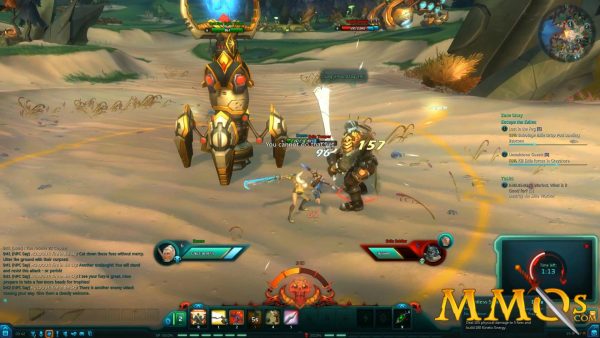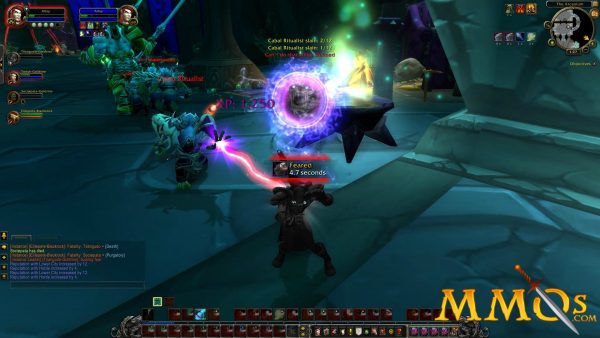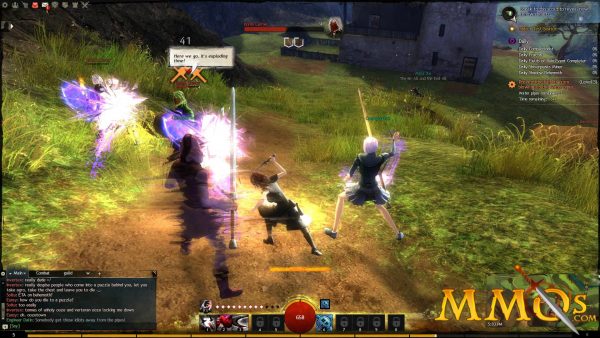The Immersive Quality In MMORPGs
Beyond the graphics, animations, quests, dungeons, and the other things which we might buy an MMORPG for, what really gives a game staying power in the industry is its immersive quality. This is something I expect none of us will be unfamiliar with. Anyone who's played an MMO for any decent length of time will appreciate the unique experience of being 'lost' in one; of achieving such a level of immersion that you respond to aspects of the game as if they were real. And yet, as precious as this experience is, it's extremely difficult to define.
When we try to review a game with respect to its 'immersive' quality, we find that we lack the terms to describe it. It's not a 'good raid' or a 'good narrative', or really any one thing, and judging immersion is analogous to judging art: it's highly subjective. We can see this immersive quality as nothing more than an aggregate of music, graphics, and story, but if it is this quality which keeps people in games, in the way it's kept me in games, then this understanding of immersion becomes difficult to correlate with the real world of gaming. To put it bluntly, the most modern, innovative MMOs—the purported 'WoW killers'—which launch with the best of all these things, still fail to compete with the simple, traditional games, and—you guessed it—World of Warcraft.
The continued popularity of WoW is the subject of much astonishment in the industry: it fails miserably in many respects when compared to its shiny competitors: graphics, questing innovation, and combat are just a few. And it has demonstrated enormous persistence. The subscription fee's provided little deterrent. And the argument that players have bought the game so they might as well keep playing doesn't work, because the payment is ongoing.
However, it's not too difficult to understand why World of Warcraft continues to dominate. Look in the YouTube comments on its soundtracks, and you'll find countless remarks such as, “All the suffering you had in your life was soothed by the beautiful experience of this game... [it] made me feel what I couldn't feel in the real world” and “This makes me want to live in Azeroth so damn bad”. Although comments often express as much frustration with the state of the game now, as fondness for how it used to be, the fact that such a profound emotional connection could be made with the game shows that Blizzard did manage to achieve this immersive effect.
Look a little closer at what precisely people love about a game like WoW, and you'll find that barely a single person is talking about the raids, the dungeons, the endgame, and the shiny new classes. I'm not questioning the importance of these features in the slightest, but the fact is that their value is short-lived, and they won't attract this sort of emotional investment which a lasting MMO requires, which is why I'm surprised that they're all anyone ever talks about.
The most precious experiences in MMOs are built on the smallest of features, often on secrets and mysteries. They're the sounds of spiders hissing, the abandoned campsites, the rare spawn that you'll discover for the first time on a map you've visited hundreds of times, the islands and communities that you'll find hours away from where you expected anything to be found, the gates which appear at the ends of the world at launch, and don't open until four years after. They can be important features in the MMO world, but they're valued because the players have had to discover them for themselves. A single experience of this kind did more to ensure my loyalty to a game than the most impressive world bosses. And let's be honest, all games have those, and the new game with new technology will probably have better ones than the game you installed three years ago.
The failure of recent games to achieve the intimacy of World of Warcraft is partly due to the relationship between developers and players. Developers invest too much effort desperately grasping players' attentions with sensational new additions. Instead, they should work with a long-term focus at cultivating player loyalty, so that people will invest hours just exploring their game, and not feel impatient for the next patch immediately after the last one.
A game that has failed to respect this recently is Guild Wars 2, whose debut expansion 'Heart of Thorns' based its new maps around a host of thrilling encounters which many players have already become tired of. Similarly, with Guild Wars 2's recent update to 'The Shatterer' dragon world boss fight, most players seemed to be disappointed by how the changes failed to live up to the scale which the announcement suggested.
A solution to make the 'The Shatterer” update more immersive would have been to avoid disclosing it. Rather than logging in excitedly to try the fight, and then logging out underwhelmed, word would have spread through player channels. Players would one day prepare for the boss as usual, and find themselves engaged in a different encounter. The experience would be thrilling, and might even inspire some people to log in regardless of developer silence, for the hope of finding something new.
These more 'epic' experiences are somewhat distinct from the others I mentioned earlier, but they nonetheless lead to the conclusion that sometimes a distance in the relationship between the developer and the player can encourage a greater sense of immersion. A world which constantly reminds you that it's 'dynamic' and 'alive' rarely enjoys much of either. It's like someone trying to sell a fake of a piece of art, while boasting how well they faked it; it's not conducive to a believable, immersive experience.
I realise this is a contentious point of view, as there's no greater frustration in an MMO than being obstructed by bugs and other annoyances, and feeling disconnected to the people who are supposed to fix it. However, we can maintain a close relationship between developers and players as far as functionality and 'quality of life' are concerned, while encouraging a certain 'distance' when it comes to creative world-building. Perhaps it's inevitable in the expansion of internet forums and social media that more emphasis would be placed on communication through developer blog posts and Reddit threads, but in my dream of dreams, I'd play an MMO in which I'd spend my time scouring the game, rather than the internet for whatever comes next. I would go so far as to say that developers should announce almost no new features at all, but rather drop them in, and allow the players themselves to navigate them independently.
I want no-one to hold my hand, and I want to experience the MMO world as a world.
I would be very interested to know your take on this, and what it is that you value in MMORPGs. I would similarly be interested to hear others' experiences of discovery or immersion in games, and if they meant as much to you as mine have to me.







